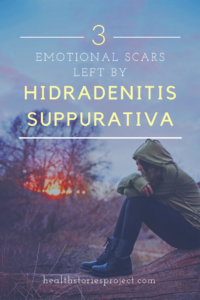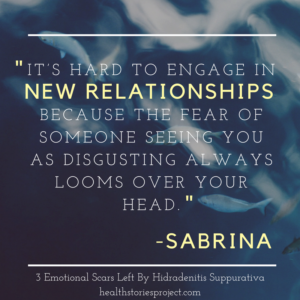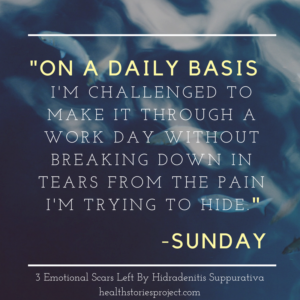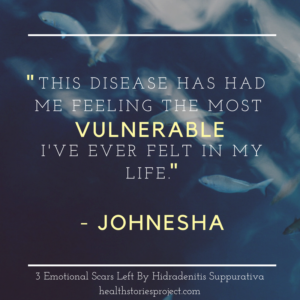It’s easier to talk about physical scars than emotional ones, but life with a chronic illness like Hidradenitis supporativa (HS) isn’t just about physical pain. Hidradenitis supporativa can leave unseen wounds that are just as serious and bothersome as their physical counterparts.



We think it’s not just dermatologists that should be aware. Friends, family, caregivers, and all physicians treating patients with HS should know about the link with depression and anxiety and how this condition affects a person’s life on a deeper level. Increased understanding means reduced stigma and getting HS patients the help they need.
So, in the spirit of better understanding, we spoke to people with HS about the emotional impact of this condition. The following are three non-physical scars HS can leave:
1. Personal relationships cut off before they start.
“You feel lonely if you’re not in a relationship because you feel as though you can’t connect with someone. They may not understand your condition and what it includes.” – Jade Ivy
“I’ve noticed that I just want to isolate myself from people because I’m embarrassed more than anything. People don’t understand the pain and suffering people with HS go through. “- Anon



“Many times when family comes over I retreat to my room so I don’t have to put on more clothes making me uncomfortable. “– Robert
“[HS is] embarrassing when it comes to your love life. Having to explain the scars…It’s embarrassing when you have to explain to your friends and hope they aren’t too ignorant to laugh and not understand. I have lost several friends.”– Aaliyah
“Not knowing others with the condition isolates the way you think sometimes because you can’t relate to anyone and they won’t understand how it affects you. Isolation can make depression worse and that affects your lifestyle: gaining weight, not caring about your health anymore, not caring about relationships, etc. “- Rob
“I was not involved with anyone before this hideous disease began, so I couldn’t bear to show nor ask a new person to share this with me. If I had been married, it’s for better or worse, hopefully, it would have helped to have support from a spouse. But I felt couldn’t share this with any new person. “– Lou
Have you been affected by HS or another health condition? Sign up to share your experiences with Health Stories Project!–> Sign Up
2. A career filled with second-guessing.
“On a daily basis I’m in fear that some movement I make at work will cause oozing from under my arm if I have an active site. On a daily basis I’m challenged to make it through a work day without breaking down in tears from the pain I’m trying to hide. On a daily basis I question whether taking a bite of an unfamiliar food will trigger a flare. On a daily basis I avoid situations that may become stressful and trigger a flare.” – Sunday



“It changes the way you dress. If you have to wear light clothing the drainage makes it very difficult. You have to have medical wound dressing supplies on standby just in case. [You have to let] your bosses know about it just in case you have to run to an emergency dermatologist appointment and it can be hard until you accept things. “- Rob
3. With Hidradenitis Suppurativa, “Everyday” stuff turns into stress every day.
“Simple tasks are hard like washing dishes, cooking etc. I feel sad most days.” – Shonda
“Living with HS makes everyday tasks difficult. From sweeping the floor to putting on clothes or just moving around is unbearable at times. The constant pain and no relief. That’s just the physical problems. Mentally you’re wondering what you did wrong, will people smell this drainage, will it leak through this bandage, etc. “– ShaRonda
“I’ve been diagnosed with depression and anxiety as well as showing OCD behavioral traits. At times I feel this is not a life worth living. The pain can be so severe that I am immobilized for days at a time. I feel helpless and powerless, worthless and useless.” – Anon



“I will find it difficult to shower, brush my hair and teeth, get dressed, use the toilet, and impossible to go to work, cook, do laundry or socialize.” – Sunday
“My moods fluctuate throughout the day. I’m quick tempered while in pain, and I am working on that, but my mind is constantly racing. This disease has had me feeling the most vulnerable [I’ve ever felt] in my life.” – Johnesha

